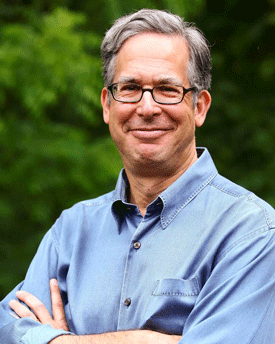Why stories matter: An interview with Andy Goodman (Part 2)

Andy Goodman, co-founder and director of The Goodman Center
Recently, I phoned Andy Goodman of the Goodman Center to chat about his work, why he thinks storytelling is important and how it can help non-profit organizations like NCC in our work. Below is Part Two of our two-part interview (Part One is here):
CBT: How have changes in technology and social media changed how we tell stories?
AG: That’s a very interesting question. I don’t believe the way we tell stories has fundamentally changed. The story is the story is the story. How we told stories 100,000 years ago and today hasn’t changed.
What’s changed is our ability to point people to stories or evoke parts of stories. In Twitter and social media, we use these tools to point to stories, with a link to watch a story or read a story. Some people will say a tweet can be a story or Instagram can be. I don’t agree — you can have threads of narrative in social media but these things are not a story in the classical sense.
New media have given ways us to connect with people briefly and get them to spend time reading stories.
CBT: How can we all become better storytellers?
AG: The first thing to be aware of when telling a story is be conscious of who is your audience. Not everyone cares about the environment [or nature] the same way you do. What does your audience care about the most that you can appeal to? Good communicators will always think about that first then shape or frame story to emphasize the point that the audience is already interested in.
My second point of advice would be: when telling a story, it needs to have twists and turns, obstacles and surprises. A story with no surprises in any way doesn’t have people leaning forward; it’s just not interesting.
Give people a reason to lean forward and say, “What happened next?"
Third, as brevity is the soul of wit, good stories don’t have to go on forever. You can tell a good story in a couple of minutes. Keep it as concise as possible — whether in text, video, audio. Less is usually more.
CBT: It seems that more and more people are talking about the importance of story. Do you agree, and if so, why are we seeing this recent popularity of storytelling?
AG: I’ve been out talking about storytelling for almost 15 years. I can tell you 15 years ago, people were not nearly as interested as they are now. The attitude when we wanted to offer workshops on storytelling was, “Sure, why not? It might be useful to us.” There was lots of leaning back, arms crossed.
Over the last 15 years that has shifted, and in last few years, dramatically so. More and more people are saying, we have to get better at storytelling. It’s not, “Should we?” Now, it’s “How do we?”
Just why is hard to say. There have been a number of threads I point to. In political campaigns, analysis is much more focused on candidates’ narrative. In the corporate world, with the rise of interest in branding and identity, storytelling is very important.
Traditionally, the not-for-profit world has tended to turn up its nose at branding. But there is now an acceptance that you have a brand whether you like it or not, and you do market it. So some tools from the business and political worlds have raised the profile of storytelling as well.
All that said, will storytelling burn out? I think not. It might be considered a fad, since it’s hot now. Interest may dip. But we have been telling stories for tens of thousands of years. That’s not going to stop. The tools and means of distribution will all change. But whether the stories are shared through tweeting or Google Glass or the Apple watch, the content will not change. Story is still the fundamental unit of human communication.
One of the problems with environmentalists is our faith that science and facts will prevail is misplaced. Yes, science and facts are important, but they do not prevail of their own. We have to bring people to see these facts. And people cannot see facts if they’re looking wrong way. Story gets them to turn their head in the right direction. It’s just human nature. That’s not to say that science is unimportant, but that our faith in science often leads us the wrong way.
I once held a storytelling workshop for climate scientists and marine biologists. Ten minutes in, one of the scientists raised his hand and asked the question: “With all due respect, isn’t storytelling the opposite of what I do? A story is a one-off; an anecdote. Science is the study of the many to determine if really a trend here or not.”
To which I responded: “Storytelling is an important complement to what you to. It’s the story that gets people to look up and pay attention to what you do. Story is key to getting them to understand what you do. It allows what you do to be heard."
CBT: Thank you, Andy!

